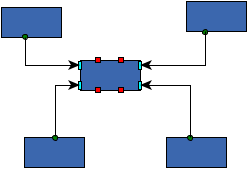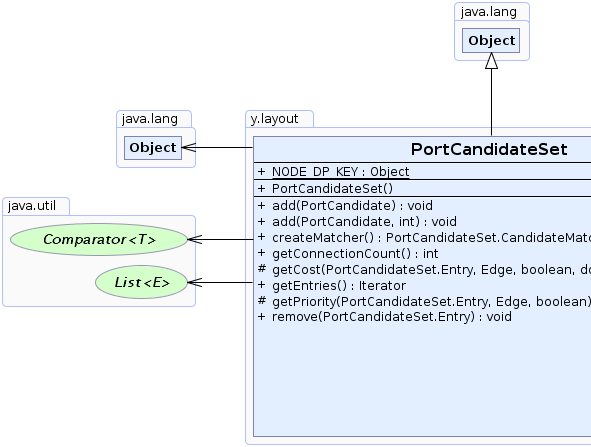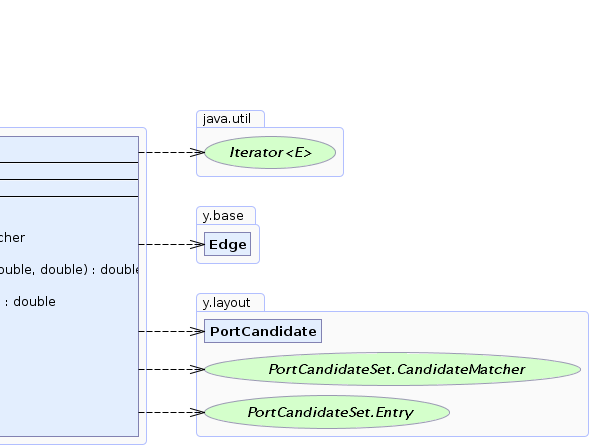 y.layout.PortCandidateSet
y.layout.PortCandidateSet
|
Search this API | ||||||||
| PREV CLASS NEXT CLASS | FRAMES NO FRAMES | ||||||||
| SUMMARY: NESTED | FIELD | CONSTR | METHOD | DETAIL: FIELD | CONSTR | METHOD | ||||||||
java.lang.Objecty.layout.PortCandidateSet
public class PortCandidateSet
This class associates PortCandidates with the nodes of a graph.
PortCandidates defined on nodes specify sides or even exact locations at which edges can be connected.
This means that an edge can be connected to any of the available node ports (unless edge PortCandidates
are specified too).
Each node PortCandidate has a capacity, i.e., a maximum number of edges allowed to connect to it.
Information about PortCandidates on nodes is held by a DataProvider that stores a
PortCandidateSet for each node and is registered with the graph using key NODE_DP_KEY.
The PortCandidates are retrieved from the PortCandidateSet through a
PortCandidateSet.Entry that holds the information about the actual PortCandidate.
This object is also used for retrieving the best candidate from a PortCandidateSet based on the cost
(lower costs are considered first) and the available capacity of each candidate.
Custom searching for the best PortCandidate can be achieved by implementing
PortCandidateSet.CandidateMatcher interface.

Not all layout and routing algorithms are able to handle PortCandidates. Major layout algorithms
that obey them are IncrementalHierarchicLayouter,
EdgeRouter, ChannelEdgeRouter and
BusRouter.
PortCandidateAssignmentStage can be appended to any layout algorithm that cannot handle port
constraints in order to assign edges to the ports specified by PortConstraints or
PortCandidates after calling the core layout algorithm.PortConstraints and PortCandidates (on edges and/or nodes) are defined
for a graph, the layout or the routing algorithm will try to match both of them in order to find an appropriate port.
The matching process depends on the actual algorithm. |
 |
| Nested Class Summary | |
|---|---|
static interface |
PortCandidateSet.CandidateMatcher
A PortCandidateSet.CandidateMatcher retrieves the best matching entries from a
PortCandidateSet. |
static interface |
PortCandidateSet.Entry
This interface represents an entry of a PortCandidateSet and provides access to the actual
PortCandidate instance and the maximum number of edges allowed to connect to it. |
| Field Summary | |
|---|---|
static java.lang.Object |
NODE_DP_KEY
A DataProvider key for specifying a port candidate set for each node.
|
| Constructor Summary | |
|---|---|
PortCandidateSet()
Creates a new empty PortCandidateSet instance. |
|
| Method Summary | |
|---|---|
void |
add(PortCandidate p)
Adds a PortCandidate with capacity 1 to this PortCandidateSet. |
void |
add(PortCandidate p,
int connections)
Adds a PortCandidate with the given capacity to this PortCandidateSet. |
PortCandidateSet.CandidateMatcher |
createMatcher()
Creates a PortCandidateSet.CandidateMatcher that retrieves entries from this
PortCandidateSet. |
int |
getConnectionCount()
Returns the total number of connections allowed by the PortCandidates described by this
PortCandidateSet or Integer.MAX_VALUE if the number is unbounded. |
protected double |
getCost(PortCandidateSet.Entry entry,
Edge edge,
boolean source,
double xOffset,
double yOffset)
Calculates the penalty cost for the usage of the given entry and the given
parameters. |
java.util.Iterator |
getEntries()
Returns an Iterator over the list of candidate entries of
this PortCandidateSet. |
protected double |
getPriority(PortCandidateSet.Entry entry,
Edge edge,
boolean source)
Calculates the priority of the given entry. |
void |
remove(PortCandidateSet.Entry entry)
Removes the given entry from the list of candidate entries. |
| Methods inherited from class java.lang.Object |
|---|
clone, equals, finalize, getClass, hashCode, notify, notifyAll, toString, wait, wait, wait |
| Field Detail |
|---|
public static final java.lang.Object NODE_DP_KEY
DataProvider key for specifying a port candidate set for each node.
| Constructor Detail |
|---|
public PortCandidateSet()
PortCandidateSet instance.
Addition of PortCandidates to this set can be performed using
add(PortCandidate) or add(PortCandidate, int).
| Method Detail |
|---|
public void add(PortCandidate p)
PortCandidate with capacity 1 to this PortCandidateSet.
Addition of PortCandidates with capacity greater than 1 can be performed using
add(PortCandidate, int).
p - the PortCandidate to addadd(PortCandidate, int)
public void add(PortCandidate p,
int connections)
PortCandidate with the given capacity to this PortCandidateSet.
The capacity value defines the maximum number of edges allowed to connect to the candidate. If no limitation
for this number exists, Integer.MAX_VALUE can be used.
The capacity must be greater than zero.
p - the PortCandidate to addconnections - the capacity of the given port
java.lang.IllegalArgumentException - if the given capacity is less than or equal to zeropublic int getConnectionCount()
PortCandidates described by this
PortCandidateSet or Integer.MAX_VALUE if the number is unbounded.
PortCandidateSetpublic void remove(PortCandidateSet.Entry entry)
entry from the list of candidate entries.
entry - the entry to removepublic java.util.Iterator getEntries()
Iterator over the list of candidate entries of
this PortCandidateSet.
Iterator over the list of PortCandidateSet.Entryspublic PortCandidateSet.CandidateMatcher createMatcher()
PortCandidateSet.CandidateMatcher that retrieves entries from this
PortCandidateSet.
Each next best matching candidate is determined based on its cost, its current available capacity and based on whether or not its direction is consistent with the desired one.
This method may be overridden to support custom implementations of PortCandidateSet.CandidateMatcher.
EdgeRouter supports PortCandidateSets, it doesn't
support custom PortCandidateSet.CandidateMatcher implementations.PortCandidateSet.CandidateMatcher instance
protected double getCost(PortCandidateSet.Entry entry,
Edge edge,
boolean source,
double xOffset,
double yOffset)
entry and the given
parameters.
The cost is equal to the cost of usage of the
associated port candidate.
This method may be overridden to customize the calculation of the cost of usage of an
entry.
entry - the entry for which the cost is computededge - the edge that will connect to the PortCandidate associated with the entrysource - true if the given edge connects to its source node, false otherwisexOffset - the preferred X-offset of the port relative to the center of the nodeyOffset - the preferred Y-offset of the port relative to the center of the node
PortCandidateSet.Entry
protected double getPriority(PortCandidateSet.Entry entry,
Edge edge,
boolean source)
entry.
Higher priority means that the entry will be considered earlier by a PortCandidateSet.CandidateMatcher.
This method may be overridden to customize the calculation of the priority of entries.
entry - the entry for which the cost is computededge - the edge that will connect to the PortCandidate associated with the entrysource - true if the given edge connects to its source node, false otherwise
PortCandidateSet.Entry
|
© Copyright 2000-2025, yWorks GmbH. All rights reserved. |
||||||||
| PREV CLASS NEXT CLASS | FRAMES NO FRAMES | ||||||||
| SUMMARY: NESTED | FIELD | CONSTR | METHOD | DETAIL: FIELD | CONSTR | METHOD | ||||||||